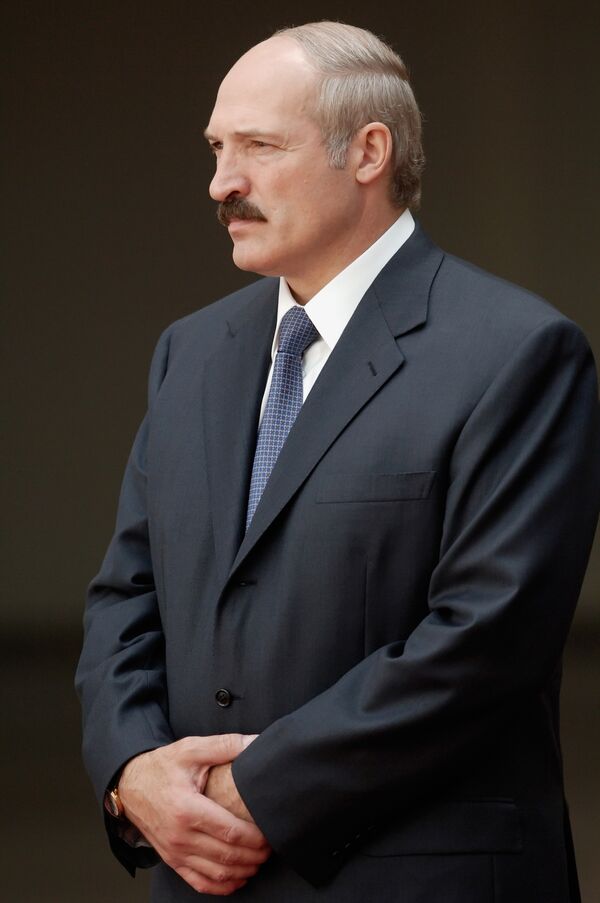As the presidential race gains momentum in Belarus, the "last dictator in Europe," Alexander Lukashenko, is acting more and more like a character out of an Emir Kusturica film.
"If you decide to make something respectable, we will be honored to work with you," the Belarusian president graciously told the world-famous Serbian director during a recent meeting in Minsk.
Perhaps Lukashenko's mind was on the upcoming election when he talked about making something "respectable." A week before he met with Kusturica, Lukashenko said the December 19 election would pass off "without a hitch" and that "there will be no fighting; we'll be very well behaved."
Anyone familiar with the work of this wildcard of Balkan cinema knows that fighting is a major feature in his absurdist films. And anyone who follows politics in Belarus knows that fighting is a feature in every election.
The plot is always the same. First, the state-run media announce that Lukashenko has won in a landslide. Next, the opposition candidate calls for a protest. Protestors gather, and then the Belarusian riot police - who are not known for their sense of humor - arrive and disperse the assembled masses with short sharp cinematic blows to their kidneys.
Lukashenko's choice of the word "respectable" should be interpreted as a bit of postmodern cunning. The president himself hinted at the meaning of his comment when he said that Kusturica "doesn't know how to make a bad film."
The director repaid the compliment, saying that Lukashenko has an "original" style of governing, which is absolutely true. Just as Kusturica is incapable of making a bad film, the Belarusian president is incapable of holding normal elections.
This has been common knowledge since at least 1996, but EU leaders and the leadership of several EU countries have recently managed to forget it. The overall effect is distinctly reminiscent of one of Kusturica's black comedies.
Polish Foreign Minister Radoslaw Sikorski, who was in Minsk on November 2 together with his German counterpart, promised to hold Lukashenko to his word that "the election will be held in compliance with the highest democratic standards."
"Unless there is obvious bias, I can assure you that this is exactly how the elections will be held," Lukashenko replied.
Sikorski joined in the comedy routine, saying that he hoped this election would come off better than the last one.
"Yes, much better," the Belarusian president replied.
German Foreign Minister Guido Westerwelle excelled at playing the fool, crowning the exchange with this gem: "Democratic elections will be seen as a move in the right direction."
If you remember that 92% of electorate apparently voted for Lukashenko last time, then "much better" probably means that only 90%, or heaven forefend as few as 89%, of voters will vote for him this time.
Sikorski said that if the Belarusian elections are recognized as democratic, the EU would resume financial assistance to the country. He even named a figure, 2 billion euros. Even if the Europeans refuse to give Belarus the money, Lukashenko will be able to use Sikorski's promise to score political points. He can turn to his people and denounce Europe for never keeping its promises.
Why is the EU playing this game? Because it is a hostage to its own ideological bias. Europe believes that Russia is behind all undemocratic tendencies in the post-Soviet space. European politicians refuse to recognize that the authoritarian Central Asian regimes and other post-Soviet governments have strained and sometimes openly hostile relations with Moscow. They are trying to exploit Lukashenko's falling out with the Russian leadership. They will support him, give him a chance, and hope that he will see the light and help democratize Belarus.
Lukashenko has already benefitted from his election campaign, and the blame cannot be laid at Moscow's door this time. The Belarusian president has broken out of his diplomatic isolation. Now that Lithuanian President Dalia Grybauskaite has visited Minsk and Sikorski and Westerwelle have assured him of Europe's goodwill, Lukashenko can portray himself as a European politician. Even Lidia Yermoshina, the chair of his Central Election Commission, has been talking about "liberalism."
Lukashenko is prepared to pay for Europe's recognition in his favorite currency, words. "Legitimate elections are more important to us than to anyone on the planet," he assured his foreign guests.
But words and smiles will not alleviate the economic problems in Belarus, which can only be solved jointly with Russia. Lukashenko's attempts so far remind me of Kusturica's characters, who mount machine guns on luxury cars and turn wheelchairs into electric cars.
The idea of replacing Russian oil with Venezuelan crude, which Lukashenko's friend Hugo has promised to supply at $647 per ton, will burn through the Belarusian budget in no time. And there are problems with unloading the oil at the Lithuanian port of Klaipeda.
When Lukashenko requested a discount, Lithuania's Deputy Energy Minister Romas Svedas replied that the terminal was already working at capacity without Belarusian contracts.
The Belarusian president should have considered that his country is landlocked before picking a fight with Russia.
The EU has spent 15 years trying to convince Russia to abandon Belarus, and now finds itself in a better position to pressure Lukashenko than ever before. Instead it has apparently decided to save him.
This would be a depressing turn of events. Mikhail Gorbachev was right when he said that a new Europe must be built simultaneously in the west and in the east. There is simply no other way.
The views expressed in this article are the author's and do not necessarily represent those of RIA Novosti.



